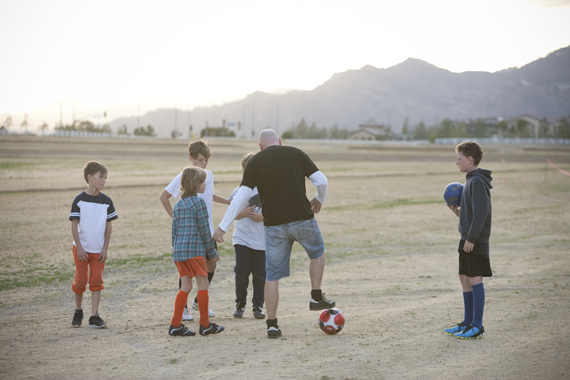(Meta)Physical Education is a series about the lessons that Alex Tzelnic, a Zen practitioner, has learned while teaching gym at a Montessori school. You can read more of Tzelnic’s stories here.
After finishing my yearly spiel about rules this morning—the one in which I talk about participation and commitment, about how the work that we do in gym is similar to the work that we do in the classroom, and that even though we may not always like it, completing this work will challenge us, and make us better athletes, teammates, and disciples of Michelle Obama—Amanda, a feisty third grader, remarked, “Great speech, Alex.”
I didn’t want to laugh. Laughing would indicate to her classmates that undermining your teacher with a well-timed sarcastic comment is acceptable behavior. But in the battle between laughing and being teacherly, laughter always seems to win. When a student pokes a needle into the inflated balloon of your own gravitas, it’s hard to remain serious.
As a teacher I’m always dancing on the edge between serious and silly, order and chaos, especially in PE, where chaos within limits is the name of the game. It is my job to maintain a safe and structured environment while also allowing my students to explore their athletic potential and figure out what they are capable of. This kind of exploration frequently involves flying projectiles, so my goals aren’t always compatible.
Much of the same dynamic exists within the walls of a monastery. There are teachers and there are students, who, at the instruction of their teacher, spend their time staring at walls, washing dishes, cleaning floors, and figuring out what they are capable of (thankfully, with fewer flying projectiles). The teacher walks into the room and everyone straightens, notices in that moment how their posture is, their minds returning to the room from various flights of fancy. We imbue the teacher with special power, whether he or she actually possesses it or not, because we want to believe that there is someone out there with authority, with special power, who can tell us how to be; who can help us make sense of the chaos inherent in being human.
Aside from my whistle (and perhaps my beard, which my students seem particularly awed by), I have no special power. When I first began to teach at Cambridge Montessori School eight years ago, I was terrified that the students would mutiny. Couldn’t they tell that should they decide to play dodgeball rather than tag, or spend the whole class racing around the gym on scooters, there was no real power I possessed to stop them? What could I do, scream “Help!” down the hallway and hope the librarian would come running to the rescue?
One of the first things that I learned, however, was that the students seemed more comfortable when I assumed the role they expected of me. During chaotic moments, when I blew the whistle and asked for attention, the students listened. When someone got hurt, as inevitably happens when flying projectiles return to orbit, the students quickly brought me over to the injured party. When I walked out into the hallway to greet them before gym, they straightened.
It has taken me years to recognize the responsibility that comes with this trust. Early on, when I realized, with some surprise, that the students liked me, I was too eager to be their friend, to sacrifice my authority for the boost this relationship gave to my ego. Now, I know that though our interactions can be full of joy, and though they often treat me like a human jungle gym, there is a more important process going on, one that will hopefully result in stronger bodies and sharper minds and allow me, when need be, to facilitate this growth.
But I’ve also come to recognize that there is a thin line between exercising authority and misusing power. One of the most common mistakes beginning teachers make (and it is a lesson I learned the hard way) is to fight fire with fire. Chaos is distressing and the tendency is to bring about order as fast as possible, by whatever means necessary. The trick, of course, is to be at ease with unease. Once upon a time I would try and wrest control with ear-piercing whistle blasts. Now I find myself twirling my whistle and glancing at the wall clock as the class begins to take notice and sit up straight. In these moments, part of me can’t believe it’s working and the other part of me can’t believe I’m not still the kid on the bench causing the ruckus. But, as Shunryu Suzuki said, “The best way to control people is to encourage them to be mischievous. Then they will be in control in a wider sense. To give your sheep or cow a large spacious meadow is the way to control him.” I have a spirited flock and so I try and provide a spacious meadow.
When I went through my yearly spiel about rules with another class, I asked them to come up with some rules of their own in small groups. As we went around the circle sharing their ideas—“Treat others as you want to be treated”; “Don’t die”; “Be hippies about everything”—one group came up with a particularly interesting rule: “Worship Alex.” I hesitated to write it down. It would only serve to inflate the balloon of my own gravitas. And yet it also indicated the role I’ve been cast in by my students, and it’s a role I am all too happy to play. I had to laugh.
[This story was first published in 2015.]
Thank you for subscribing to Tricycle! As a nonprofit, we depend on readers like you to keep Buddhist teachings and practices widely available.
